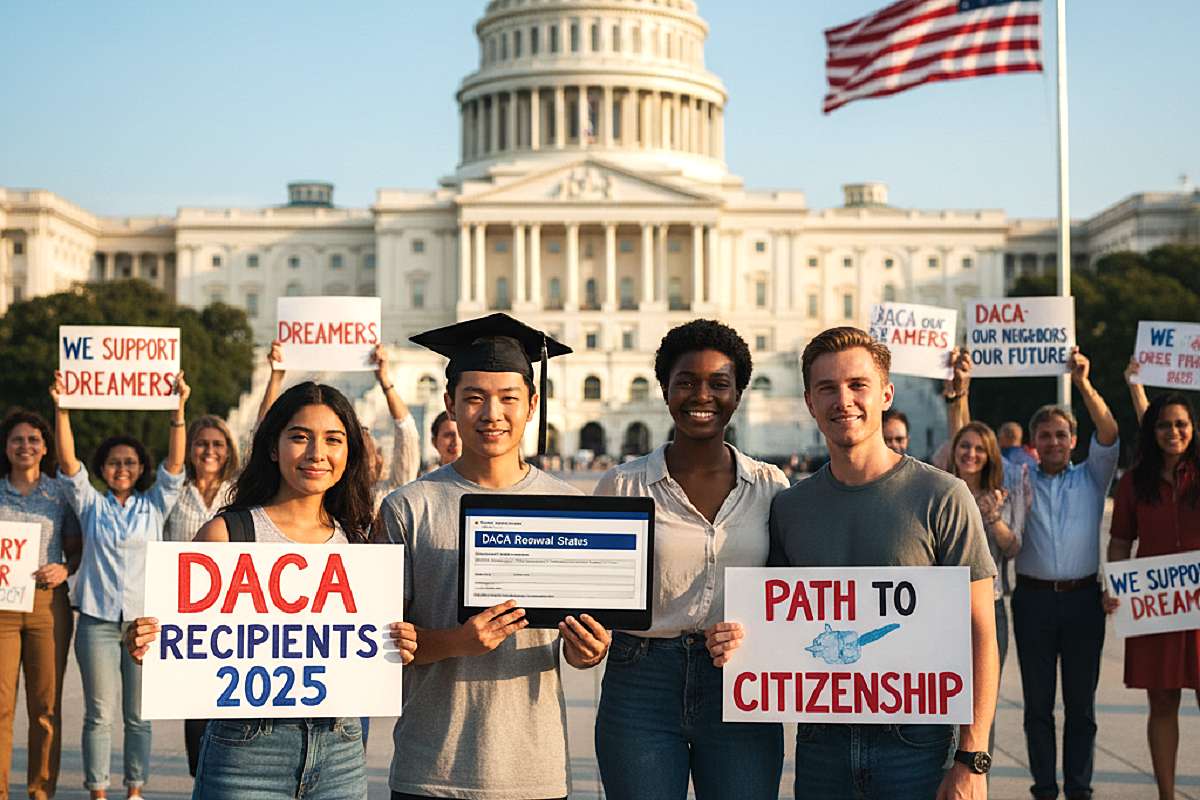New Developments for DACA in 2025: In 2025, DACA recipients and prospective applicants face pivotal changes. The federal government may soon resume accepting new applications for Deferred Action for Childhood Arrivals (DACA), a program long closed to first-time requests. (According to a Justice Department court filing)
Under the proposed changes, all U.S. states except Texas would be eligible to receive full DACA benefits, including work authorization. Texas residents, due to ongoing litigation, may be limited to deportation deferral without work permits.
As of March 2025, approximately 525,210 active DACA recipients are enrolled nationwide, though that number has declined slightly year over year.
These developments come after a 2025 ruling by the Fifth Circuit Court of Appeals that narrowed prior injunctions and limited the block on new DACA applications to Texas only.
What Is DACA & Who Qualifies
Deferred Action for Childhood Arrivals (DACA) was established in 2012 under President Barack Obama. The program provides qualifying individuals—often known as “Dreamers”—temporary protection from deportation and eligibility for work authorization.
To be eligible for DACA, applicants must meet several criteria:
- Must have entered the U.S. before turning 16
- Must have resided continuously in the U.S. since at least June 15, 2007
- Must have completed high school, obtained a GED, or been honorably discharged from the U.S. military
- Must have a clean criminal record (no felonies, significant misdemeanors, or multiple misdemeanors)
- Must be under age 31 as of June 15, 2012
It’s important to note that DACA is not a path to permanent residency or citizenship. It is a temporary program renewed every two years, granted at the discretion of U.S. Citizenship and Immigration Services (USCIS).
Renewal, Status & Challenges
Existing DACA holders can still file for renewals, typically 120 to 150 days before expiration. USCIS continues to accept renewal requests.
However, new (initial) applications have not been adjudicated since 2021. While new filings may be accepted, processing has been on hold in many jurisdictions pending legal resolutions.
In Texas, DACA recipients may soon lose the ability to renew work authorization, due to the Fifth Circuit’s ruling limiting benefits in that state.
Legal advocacy groups warn that future litigation may further jeopardize status for recipients, especially if additional court rulings sever work authorization from deportation deferral.
Citizenship & Legal Status: What’s Possible
One persistent question is: Can a DACA recipient become a U.S. citizen? The short answer: Not directly. DACA itself does not grant lawful permanent resident (green card) status nor citizenship. Recipients must find another legal pathway—such as family-based or employment-based immigration—to adjust status.
Some recipients qualify for other protections or pathways, such as marriage to a U.S. citizen, asylum, or other relief depending on individual circumstances. However, those paths are distinct from DACA and often involve more complex legal processes and long waiting periods.
Another uncertainty is whether Congress will pass legislation to convert DACA into a permanent status (with citizenship path). Some proposals, like the American Dream and Promise Act, have been introduced in past sessions, but no such measure has yet passed.
What It Means for Recipients & Applicants
- Immediate impact: Prospective applicants outside Texas may soon see action on previously frozen DACA cases, once courts approve the filed proposals. But for now, initial applications remain in limbo.
- Geographic inequity: The split in treatment between Texas and other states could lead to a patchwork of benefits and restrictions.
- Renewal urgency: Current recipients should file renewals within the recommended window to avoid lapses in protection.
- Long-term uncertainty: Without legal settlement or legislation, DACA’s future remains tied to court rulings and shifts in political power.
FAQs
A DACA recipient is an individual, often called a “Dreamer,” who entered the U.S. as a child without legal status and was granted temporary protection from deportation and eligibility to work through the DACA program.
No. DACA does not confer lawful resident status. Recipients remain in a deferred action status, which is temporary and can be revoked.
Not directly through DACA. Recipients must change status through family-based or employment-based immigration pathways or other legal mechanisms to become citizens.









